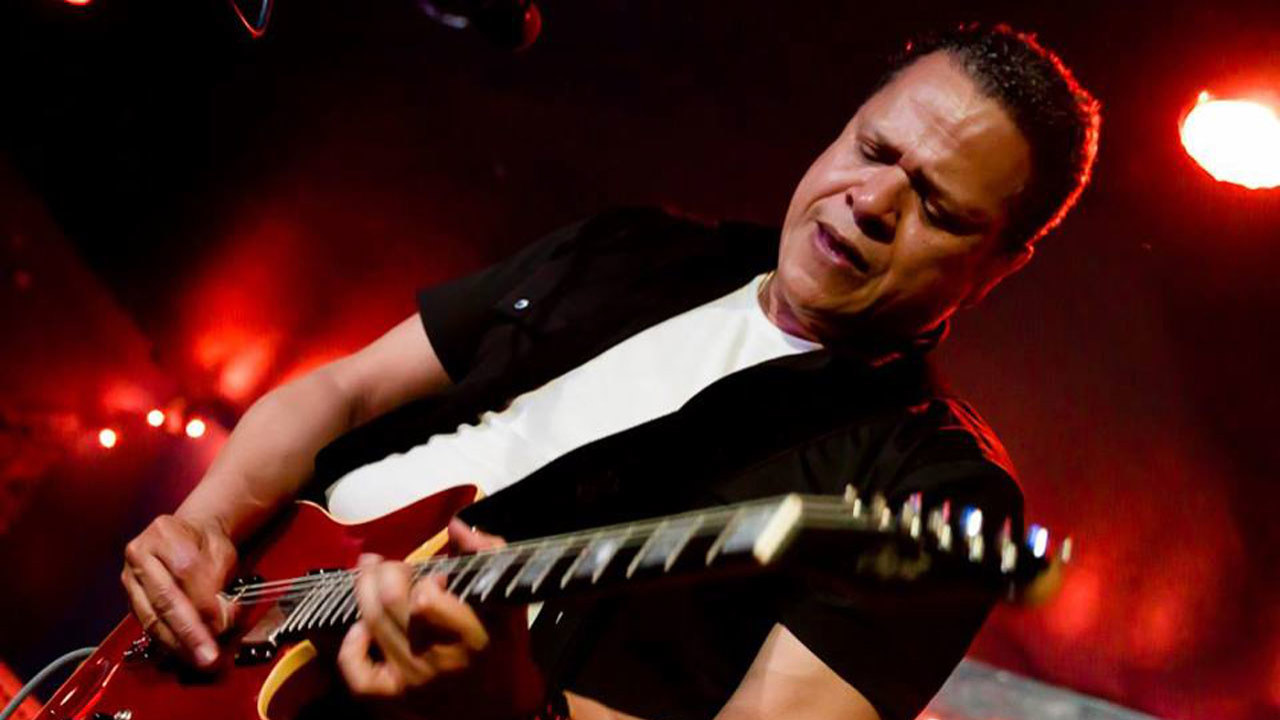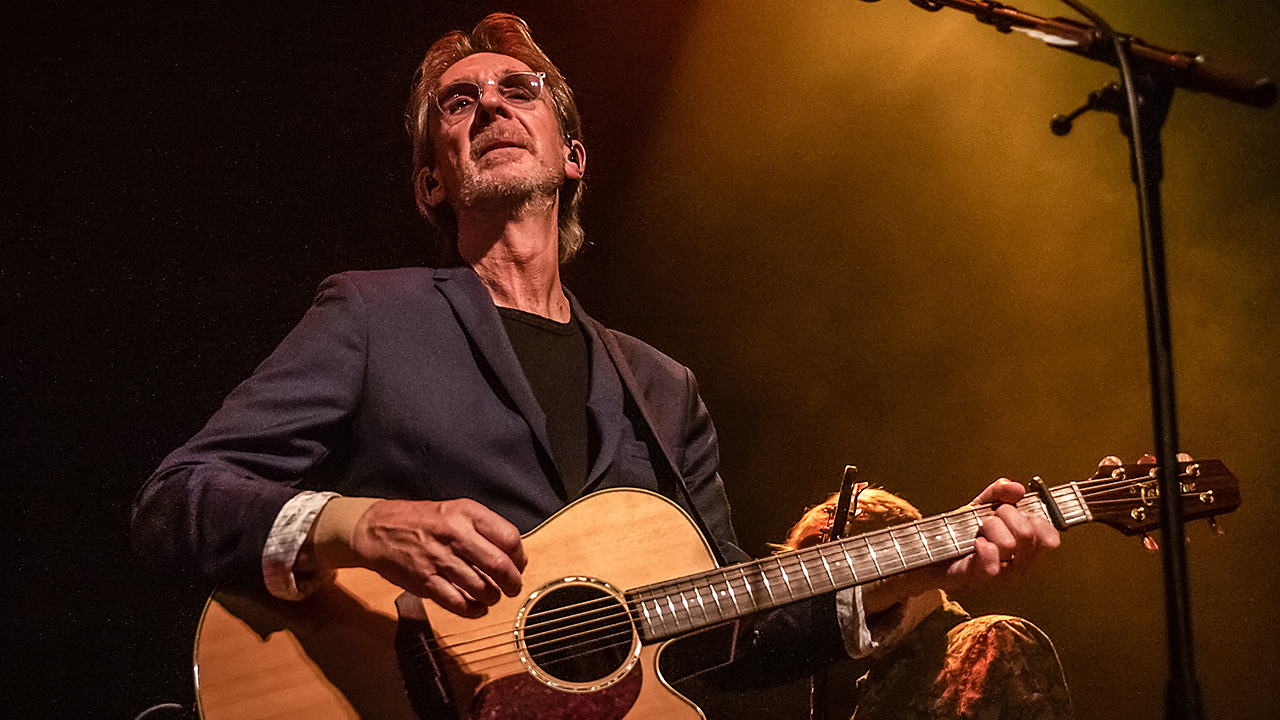Eddie Martinez's 5 Essential Guitar Albums
Five extraordinary six-string collections courtesy of a man who's played with everyone from David Lee Roth to Meat Loaf

Select the newsletters you’d like to receive. Then, add your email to sign up.
You are now subscribed
Your newsletter sign-up was successful
Want to add more newsletters?

Every Friday
Louder
Louder’s weekly newsletter is jam-packed with the team’s personal highlights from the last seven days, including features, breaking news, reviews and tons of juicy exclusives from the world of alternative music.

Every Friday
Classic Rock
The Classic Rock newsletter is an essential read for the discerning rock fan. Every week we bring you the news, reviews and the very best features and interviews from our extensive archive. Written by rock fans for rock fans.

Every Friday
Metal Hammer
For the last four decades Metal Hammer has been the world’s greatest metal magazine. Created by metalheads for metalheads, ‘Hammer takes you behind the scenes, closer to the action, and nearer to the bands that you love the most.

Every Friday
Prog
The Prog newsletter brings you the very best of Prog Magazine and our website, every Friday. We'll deliver you the very latest news from the Prog universe, informative features and archive material from Prog’s impressive vault.
Over a 30-year-career, session and touring pro Eddie Martinez has performed with artists as disparate as Mick Jagger, Lou Reed, Tina Turner, Robert Palmer, Celine Dion and Run-D.M.C. But whatever stylistic avenue he’s called upon to navigate, his credo is always the same: Be yourself.
“Authenticity is probably the biggest thing a guitarist has to offer,” Martinez says. “As a player, during the course of your development, you try to absorb influences by listening to and emulating a wide range of guitarists. But you should always make sure that those influences are just little flavours of your own style. Be true to yourself. Find your own voice and be authentic. The way I look at it is, nobody can be me better than me – that’s why they call me.”
Although he’s fluid, dexterous soloist, Martinez is “a chords and melody guy” through and through. “It’s all about composition and songs,” he elaborates. “The greatest solos are always on songs that are just badass and powerful. When a solo is really good, it’s because the song is crying out for it, and it isn’t the same song without that great lead moment. But it all starts with the song itself – you can’t get around that – and the solo elevates it and takes it somewhere else. You have two forms of expression that complement each other.”
In compiling his list of “essential guitar albums,” Martinez was struck by the fact that none of his choices date past 1990. “It’s not as if I’ve stopped listening,” he says. “There’s still so many new guitarists doing great things. But when I think about what was essential to me as a kid and what’s important to me now, it’s an interesting dichotomy. You think about your beginnings, and you try to put yourself back in that place, but you also consider where you are as a player in the present. The funny thing is, most of the things that shaped you back in the day are the things that last.”
The Beatles – Revolver (1966)
“It’s the first record I ever bought, but I had the mono U.S. version as a kid, so it didn’t have songs like And Your Bird Can Sing on it. It wasn’t till I bought the compilation album Yesterday… And Today that I was able to hear it. What a guitar riff. It’s a tricky, twangy marvel on an album bulging with all sorts of greatness.
“I was blown away by varied sounds of the guitars. Whether it was the Casinos or the cherry Les Paul that George was playing, the Beatles really pushed the sonic textures somewhere new. And compositionally, it’s a masterpiece. Songs, melody, and brilliant guitar playing and production – it’s got it all.
Sign up below to get the latest from Classic Rock, plus exclusive special offers, direct to your inbox!
“The Beatles were also using Ricks and Gretsches, putting them through Vox amps, and I think they were using flatwound strings, as well. They always managed to make the guitars sound interesting and exciting, but their experiments fit the emotional scheme of what they were writing. Nothing was stylised in a showy way.
“And, of course, there’s backwards guitar. Man, that was so exciting on songs like Tomorrow Never Knows and I’m Only Sleeping. They broke new ground. This stuff is so fundamentally important to where people took guitar playing. It’s incredible accompaniment to iconic songs.”
Cream – Goodbye Cream (1969)
“Disraeli Gears was the first Cream record I ever got, but Goodbye Cream meant a lot more to me in a lot of ways. I could go on about Eric Clapton’s solo on Badge – it just kills me every time.
“George Harrison co-wrote that song, and he plays on it, too, so it’s not the actual Cream as a trio. Of course, right around this time Eric had guested on While My Guitar Gently Weeps on the White Album. These guys would play on each other’s records, and it was just like friends helping each other out – and the music would live on and on for decades.
“Eric’s playing is extraordinary. Politician is brilliant, and I love Cream’s version of I’m So Glad. But Badge, for me, is the defining moment on the record. It’s right up there with the guitar solo on I Feel Free from Fresh Cream. When Eric flips the toggle switch on his guitar and it goes to the neck pickup, the tone changes in such a beautiful way. The sound of the Leslie cabinet is so immense – it engulfs you.”
The Jeff Beck Group – Beck-ola (1969)
“It’s hard to pick from the early, rough and ready stuff and the contemporary albums, but I think Beck-ola is a more significant Jeff Beck record for me. There’s something so raw about it. When I hear Plynth (Water Down the Drain) or Jeff’s version of Jailhouse Rock, I’m just floored. This big wall of analog goodness hits me in such a great way.
“This is early Jeff Beck, but it’s almost as if he’s already fully formed as a guitarist. This was pretty much my exposure to Beck, and so I went back and discovered the Yardbirds records. That’s always a neat feeling – ‘Wow, he did all this stuff before the other thing.’ That happens a lot with the British guys. Their stuff runs deep.
“Spanish Boots is another great one. What riffs! The music just flows from Beck. It’s as if the guitar parts are being beamed to him from somewhere in outer space. You don’t hear him reaching for notes; you can’t hear the craft that goes into it. Nothing feels calculated. It’s all just streaming from him, and everything’s in the moment. Playing guitar comes as naturally as breathing to him.”
The Jimi Hendrix Experience – Electric Ladyland (1968)
“When I think of a perfect Hendrix album, it’s Axis: Bold as Love, but from the standpoint of a sustained guitar adventure, it’s gotta be Electric Ladyland. It has things that are more organic, to use an overused word, like Voodoo Chile, the longer version, with Steve Windood on organ and Jack Casady on bass. That’s absolutely brilliant.
“And then you’ve got 1983…(A Merman I Should Turn to Be), with absolutely incendiary guitar playing. Hendrix is burning it down. And Crosstown Traffic – there’s too many incredible guitar moments to even talk about. It’s all genius stuff. And his version of All Along the Watchtower – he made Dylan’s song his own. That’s dangerous guitar playing there, so full of vision and imagination
“Jimi Hendrix was my first concert. I went by myself to see him at the Singer Bowl. What an incredible experience. I was a little kid, and there was Hendrix doing his thing on his Strat. Obviously, he couldn’t play backwards guitar, but it sure sounded like it. He could make the guitar sound like anything. Talk about a first concert spoiling you for life. Where do you go from seeing Jimi Hendrix?”
Michael Landau – Tales from the Bulge (1990)
“Here’s a guitarist who probably isn’t named too often, but he should be. I can’t tell you how much respect I have for Mike Landau, not only for his scope and range as a player, but also for the intelligent way he approaches the voicings to his chords. He’s utterly unique.
“Mike has played on so many records with some of the biggest artists around. He’s pretty special in that you can tell who he’s listened to, but at the same time he always sounds like himself. Not a lot of cats can do that. They always sound like they’re copying somebody a bit too much. With Mike, he puts it all in a blender and it sounds like him.
“I look at this album as a guitar Heavy Weather. It’s almost as if a really cool, contemporary guitarist was playing over some Zawinul compositions. That’s the feeling I get from it. The tones are heavy and the playing is killin’. And then he’s got the bits from the infamous Buddy Rich tapes on the record, too, so it shows you what a great sense of humour he has.”
Joe is a freelance journalist who has, over the past few decades, interviewed hundreds of guitarists for Guitar World, Guitar Player, MusicRadar and Classic Rock. He is also a former editor of Guitar World, contributing writer for Guitar Aficionado and VP of A&R for Island Records. He’s an enthusiastic guitarist, but he’s nowhere near the likes of the people he interviews. Surprisingly, his skills are more suited to the drums. If you need a drummer for your Beatles tribute band, look him up.

